
The Louis L'Amour Lost Treasures Project
|
|---|
The Trials of Cain Bell
- End of Fragment 1 - Cain Bell Version 2
- - - - - - - - - - - - -
CAIN BELL
The wagons were passing. He stood there with his hands in his hip pockets and watched them go by. He watched the oxen passing and the flank riders, and the folks sitting on their wagon seats, and nobody looked toward him. Not even one. He stood there on the parched buffalo grass and watched their stiff, self-righteous faces as they went by. They were sure they were doing the right thing, or afraid to say otherwise, but not one of them so much as threw him a kindly glance. Not that he was expecting kindness, or much used to it. A boy growing up on his own to manhood finds little of kindness. Cain Bell had been raised by Comanches out on the plains of West Texas until he was twelve, then by a God-fearing Methodist family who treated him well enough, but were always preaching at him until he could see all their religion was in their words and their Sunday meetings, and none at all in their hearts. Watching the wagon train roll by he tried to tell himself he hated them, but he hadn't much heart in it. Truth to tell, he was shy on hate. If he could have hated he would have hated Dorothea for not speaking up, for making him look to be what he wasn't. He sure enough had gone to her wagon at night, but he was meaning no harm, only to talk. And she had invited him, else he would never have thought of it. They would never have believed the truth of it, nobody would have believed it of Dorothea with her wide blue eyes and flower face, and they would sure enough have tied and whipped him had he told them the right true story. He watched them roll by as he stood there. They had passed sentence on him without allowing a word in his own defense, taking it for granted there could be no explanation. They gave him a choice: to be whipped or to be abandoned on the plains without a rifle or any water. There was Indian enough in his training even if there was none in his blood that he knew of, and the thought of being whipped was worst of all. He was despised and hated, and truth to tell, he almost hated himself for being such a fool over a pretty face. It would have been worse had she not been revealed to him as deceitful, weak, and shallow. Or maybe it would have been better not to have known. One thing he knew now. He might be judge of horse-flesh and a good reader of trail sign but he surely didn't know anything about women-folks. Trouble was, he'd had most high feelings about women, placing them on a pedestal, like. And Dorothea, she looked like an angel with her golden blonde hair and those wide, innocent blue eyes and her white skin which she carefully kept from the sun. The wagons rolled by and nobody cast him a glance. He was Cain Bell, a no account young man who had lived with Indians and now had been drummed out of the wagon train, disgraced and left to die. - End of Fragment 2 -
Cain Bell Version 3
- - - - - - - - - - - - -
CAIN BELL The ghost of a smile haunted his eyes, and behind the smile there was another. The wagons were passing. He watched the oxen passing, and the horsemen, and the people sitting straight on their wagon seats with their eyes looking straight forward. Nobody looked at him, nobody turned toward him at all. Not one face. He stood there alone on the buffalo grass and watched them go. They despised him and he hated them. He told himself he hated them. And nobody looked at him, not even Dorothea. Even if he had told them the truth they would not have believed it. Nobody would have believed it of Dorothea with her wide blue eyes and her flower face. They would have hated him all the worse for what he could tell them, and they would not have believed him at all. He watched them roll past as he stood there. He could have been with them if he had allowed them to whip him...to tie his hands and beat him with a whip. That was what they did to men who interfered with women. The trouble was, he hadn't. He had only wanted to talk to Dorothea, and she knew it, and invited him to come, and then when her father's voice sounded, she had cried out. Nobody believed anything he said. He was despised and hated, and he almost hated himself for being such a fool. He had told himself he was in love with Dorothea, but now he watched her go by and thought how deceitful she was, how weak, and how shallow. Perhaps she was even evil. They rolled on, and he stood there, and the dust arose, and the cattle herd which followed the wagons drifted slowly by. Verne Pickens raced his horse by him and struck him with a ropes end as he raced by. He grabbed at the rope, but it whipped away and was gone. Somebody spat in the dust at his feet, and then they were gone. All but the last of them. John Light was a half-breed Indian and as he went by he dropped something into the dust at his feet, then raced on. He watched them go, then looked down at what had been dropped. It was a canteen with a pistol tied to the shoulder strap. John Light had done this for him. John Light to whom he had never spoken more than a half dozen words. Of them all, only John Light had offered help. He did not pick up the canteen because he did not want anyone to see it picked up and blame John Light. More than half of the wagon train were against him on general principals because he was a half-breed. If they realized he had helped Cain Bell they would - End of Fragment 3 - BEAU L'AMOUR'S ADDITIONAL COMMENTS: Although I think the order of the drafts presented here is the most entertaining, I believe that it is actually reversed, with the last draft being the Louis's starting point and the first one you read being the most mature of the three. It's interesting to see Louis comment on Cain Bell's adopted Methodist family. Dad was raised a Methodist and his mother was fairly strict about her religion until they moved away from Jamestown, ND. Something about escaping the claustrophobic social scene of that small town and the humbling experience of living as itinerant workers across a good deal of the American west may have moderated her outlook a good deal. For both better and for worse, Louis's father seems to have always been a bit more open minded.
|
|
LOUIS
L'AMOUR'S LOST TREASURES THE NEW BOOKS WEB SITE EXCLUSIVES The
Official Louis L'Amour Web Site
|
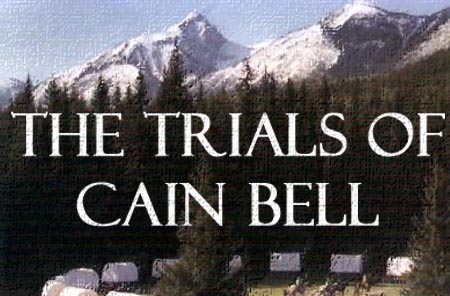
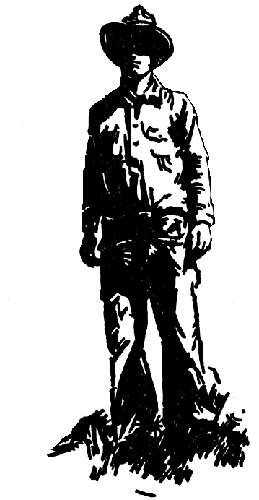
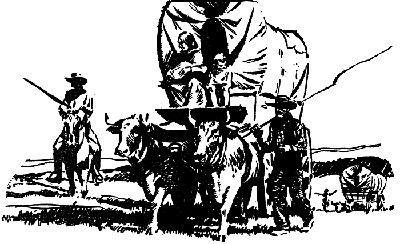 He watched them roll by as he stood there. They had passed sentence on him without allowing a word in his own defense, taking it for granted there could be no explanation. They gave him a choice: to be whipped or to be abandoned on the plains without a rifle or any water.
He watched them roll by as he stood there. They had passed sentence on him without allowing a word in his own defense, taking it for granted there could be no explanation. They gave him a choice: to be whipped or to be abandoned on the plains without a rifle or any water. 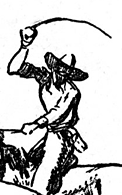 The last of the wagons rolled by and then the cattle herd followed, and one of the riders flicked him hard with a rope's end as he went by. It was that Verne Pickens. And Verne was casting eyes at Dorothea himself.
The last of the wagons rolled by and then the cattle herd followed, and one of the riders flicked him hard with a rope's end as he went by. It was that Verne Pickens. And Verne was casting eyes at Dorothea himself. 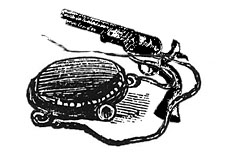 He stood there watching them go and when the last one was out of sight and only the dust hung in the air he stooped and picked up the canteen. It was full...and so was the pistol.
He stood there watching them go and when the last one was out of sight and only the dust hung in the air he stooped and picked up the canteen. It was full...and so was the pistol.